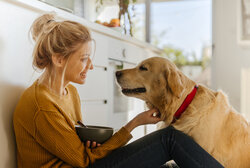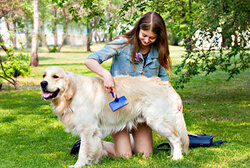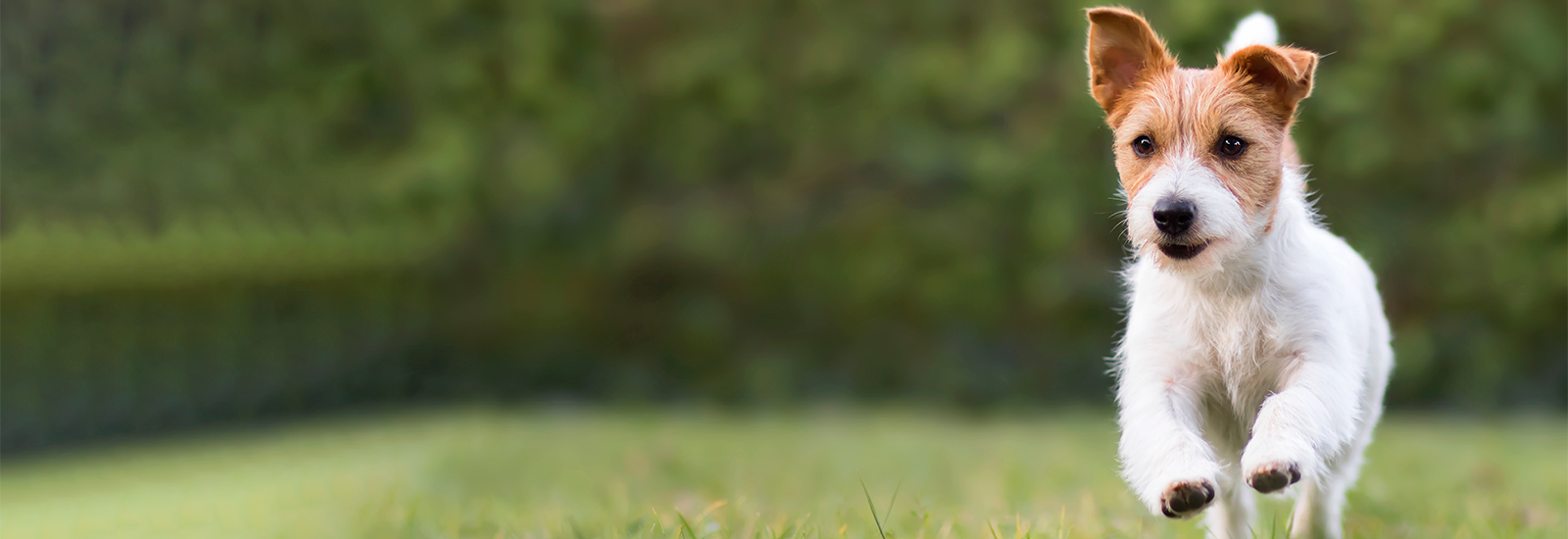My dog is too thin
A dog can become underweight due to a poor diet. This may, however, also be due to a medical condition. Here, we will explain at what point a dog is considered to be too thin and what steps should be taken to prevent this.
How much should my dog weigh?
Determining the ideal weight for your own dog is not that simple. There are rough guidelines for purebred dogs, but these should be treated with caution. A female Labrador, for example, is considered to have an ideal weight of 25 to 32 kilograms. However, a larger-sized female could still be slightly underweight at 25 kilograms. It is therefore always important to also judge a dog from a purely visual point of view. This is done using the “Body Condition Score” (BCS), which evaluates specific areas of the body (e.g. “the ribs are visible and easy to feel”). With mixed breeds, there is hardly any alternative anyway. If anything, a dog’s parent of the same sex can serve as a clue. However, it is better to look at the dog from above and from the side and to feel its body. Here, you should take into account breed-specific characteristics. For example, it is perfectly normal to be able to make out the ribs of a hunting dog.
A dog is too thin when
- it has a very narrow waistline.
- its rib bones and hip bones stand out noticeably.
- its ribs are very clearly visible.
- you can easily feel its bones with your hand.
- it loses muscle mass.
If you are unsure about evaluating your dog’s weight, it is best to talk to the vet. They will be able to tell you exactly what weight range is appropriate for your pet.
Reasons for dogs being underweight
There are many possible reasons why a dog is too thin. In order to take effective action, the cause has to be found. This could be any of the following:
- Worms
A severe case of worms can deprive the dog of important nutrients. Observe whether your dog is continuing to eat normally but is still losing weight. If your pet is also having problems with its digestion, its coat is dull, or you have found worms in its faeces, you should have a faecal sample analysed. This will provide information on whether worms are making life difficult for your dog, and if so, what type of worms. A deworming treatment is a quick remedy. However, you should be aware that this will not protect your dog from becoming infected with worms again in the near future.
- Poor food quality
Pay attention to the quality of your dog food. It should have a high meat content and provide your pet with all the essential nutrients it needs. A high proportion of grain does not reflect positively on the quality of the food. Grains and cereal by-products put unnecessary strain on the digestive tract and may prevent your dog from getting the nutrients it needs from the food.
- Not enough food
Not only the quality of a particular food is of crucial importance, but also the amount of food the dog is given. The feeding recommendations on the packaging are a good guide. It should, however, be taken into account that these are simply average amounts. If a dog is particularly active, spends a lot of time outdoors even when it is cold and perhaps has a fairly thin coat, then it will need more energy to maintain its body weight. This can be provided in the form of a slightly larger amount of food or via a food that is richer in energy.
- Hormonal changes
Spaying sometimes results in female dogs gaining weight although they are given the same amount of food. When they are on heat, however, the exact opposite often occurs. This is not only the case for females, but also for male dogs in the presence of a female on heat, who sometimes forget to eat at all. Fortunately, these phases pass, as does moulting, which can be quite energy-consuming.
- Illnesses
If a dog loses weight, it is always advisable to pay a visit to the vet. The cause of it being underweight can be a disorder that needs to be individually treated. Among the possible causes are tumour diseases, pancreatitis, gastrointestinal infections, diabetes and heart conditions. You should also have your dog’s teeth checked to see if there are any problems.
- Stress
It cannot be ruled out that stress factors may be the reason for a dog losing too much weight. For example, this could be the case if the dog is unable to eat in peace or if it is being harassed by another dog. It is important to make sure that your pet is able to eat undisturbed. What cannot be avoided, however, is a dog mourning the loss of a person or having problems with a new home. Here, it is important to be patient and to pay more attention to your dog than usual.
What are the consequences of a dog being underweight?
A dog being underweight should not be taken lightly, because it can have many different consequences:
- Weakened immune system
- Increased susceptibility to infections
- Dull coat
- Skin problems
- Increased risk of illnesses
- Nutrient deficiency
- Impaired water balance
- Breakdown of muscles
- Lethargy
- Reduced physical fitness
- Impaired wound healing
- Reduced / lack of mobility
What should I do if my dog is too thin?
If your dog is slightly underweight, it may be sufficient to slightly increase the amount of food you give it. Because, however, there are many other possible reasons apart from an insufficient supply of energy, you should analyse the situation and closely observe the further course of events. Perhaps it was simply moulting that drained the dog’s energy or a female dog on heat that temporarily diminished its interest in food.
Slight weight fluctuations are not unusual. If, however, your dog’s weight is continuously decreasing, you should arrange to see a vet. It is important to rule out any medical disorders that may be associated with your pet being underweight. This will then allow you to focus completely on its diet. Choose a high-quality food that will provide your dog with all the essential nutrients. It is advisable to divide your pet’s daily food allowance into at least two meals, the last of which should not be eaten after 5 pm.
What should you not do if your dog is underweight?
- If you have taken in an undernourished dog from a shelter, avoid trying to feed it up as quickly as possible. Your dog should be allowed to slowly become accustomed to a gradually increasing amount of food.
- Unfortunately, some dogs are a little fussy about their food. It is not a good idea to permanently compensate for lower portions of food by giving your dog treats. This can lead to an oversupply or undersupply of nutrients.
- If you suspect that your dog has worms, you should not use just any deworming product. You should first have your suspicion confirmed by a vet, who will then prescribe a suitable medication.
- Avoid trying to combat particular symptoms, such as a dull coat, with dietary supplements. It is important to establish the cause and to take the appropriate corrective action.
- An underweight dog is not capable of peak performance. However, you should not be overly protective by excessively reducing the time spent walking and playing together.
You may also like this

My dog isn't eating
If your dog is not eating, this can be due to a variety of…

Dangerous food for your dog
You should not give these food items to your dog

Deworming dogs
Regular deworming is useful

Moulting in dogs
How to help your dog during moulting
